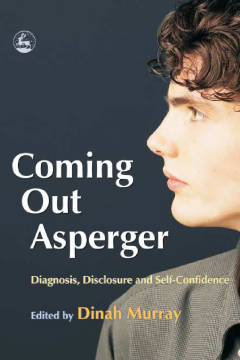
BOOK
Coming Out Asperger
Jennifer Overton | Wendy Lawson | Jacqui Jackson | Dinah Murray | Dennis Debbaudt | Tony Attwood | Stephen Shore | Liane Holliday Willey
(2005)
Additional Information
Book Details
Abstract
Coming Out Asperger explores the complexity of diagnosis for Asperger Syndrome, the drawbacks and benefits of disclosing a diagnosis of a 'hidden disability,' and how this impinges on self-esteem. The contributors include some of the best-known and most exciting writers in the field of Asperger Syndrome (AS) today, and include individuals on the autism spectrum, parents and professionals. The broad range of the chapters, which draw on anecdotal, professional and research-based evidence, make this book a comprehensive and highly original consideration of the implications of an AS diagnosis.
The ever-difficult question of who to tell and when once a diagnosis has been confirmed is discussed in great depth. Liane Holliday Willey and Stephen Shore examine the dynamics of disclosure, its risks and the possible effect on self-confidence. Jacqui Jackson looks at how a diagnosis impacts upon family life. Tony Attwood provides a clinician's view of diagnosing adults, and Lynne Moxon, Wendy Lawson, Dora Georgiou and Jane Meyerding discuss adult issues surrounding disclosure, including how to deal with relationships and sexuality, and disclosure in the workplace, as well as social and disability issues.
A unique and fascinating insight into the important issue of diagnosis disclosure, this book is an essential guide for people with AS, parents, teachers, professionals and all those who have ever felt confused about revealing a personal issue.
Whether you are a person with AS, a parent, teacher or professional who is involved with a person diagnosed with AS, this book can offer support in dealing with issues surrounding disclosure. Issues covered throughout the book range from how you might tell your child about their diagnosis to issues surrounding relationships and sexuality for adults with AS.
Autism Matters
It would be particularly useful for a wide range of professionals, including educationalists who are seeking detailed information about Asperger Syndrome and Autism, and parents would benefit form reading the book too.
www.youthinmind.net
This collection shares the stories of people with Asperger Syndrome and offers guidance on coping with the diagnosis and deciding whether to tell other people. The 18 chapters discuss the symptoms and diagnostic assessment of the disorder, boosting confidence in people with a monotropic disposition, telling peers at school, and the need to develop tolerance in society.
Book News
Table of Contents
| Section Title | Page | Action | Price |
|---|---|---|---|
| Contents | |||
| Illustrations | |||
| Preface | |||
| Introduction | |||
| Why make cheese? Basic cheesemaking principles | |||
| Part I | |||
| Bacteria | |||
| Factors affecting the survival of bacteria; | |||
| bacteria in cheese | |||
| Part I1 | |||
| From milk to cheese | |||
| Chapter 1: Milk | |||
| Milk production; reception; analysis; pasteurization; | |||
| cultures; coagulation | |||
| Chapter 2: Curd | |||
| Cutting; stirring; removal of whey; washing and salting; | |||
| moulding and pressing; weighing; brining | |||
| Chapter 3: Cheese | |||
| Maturation; Provolone; preserving and record | |||
| keeping; common problems and their causes | |||
| Part III | |||
| Beyond cheesemaking | |||
| Chapter 1: Other foods from milk | |||
| Whey; Ricotta, cream; butter; yoghurt | |||
| Chapter 2: The rural cheese factory 63 | |||
| Location; construction; equipment; production costs; key points | |||
| Appendices | |||
| 1. Cheese formulae | |||
| 2. Types of dairy cultures |
